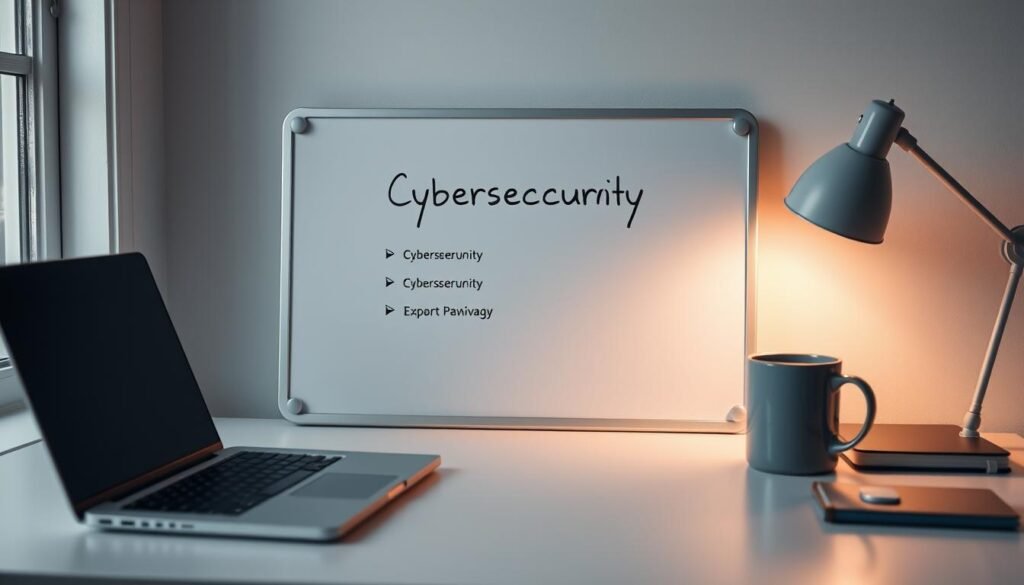As of 2023, the global cybersecurity job market is facing a crisis, with over 3.5 million positions unfilled. This alarming figure highlights the urgent need for skilled professionals in this field. The question of whether Cybersecurity is hard to learn is valid, yet numerous Cybersecurity tips are available to guide aspiring learners. In today’s digital age, acquiring cybersecurity expertise is not just advantageous; it’s imperative for safeguarding both personal and organizational data against ever-present threats.
We will explore practical strategies to boost your Cybersecurity success journey. Whether you’re embarking on your first steps or expanding your current skill set, a clear path to proficiency exists.
Key Takeaways
- Cybersecurity is essential for protecting data and systems.
- Many resources, including online courses and books, can aid learning.
- Understanding basic concepts is crucial for beginners.
- Networking within the community can provide valuable insights.
- Continuous practice and hands-on experience are vital for retention.
- A positive mindset and realistic goals can enhance learning outcomes.
Understanding the Basics of Cybersecurity
The realm of cybersecurity is vital for safeguarding data in our digital age. For those new to this field, grasping Cybersecurity Basics is essential. A foundational understanding begins with a clear Cybersecurity Definition and recognizing its importance for both individuals and organizations. Let’s examine some key concepts and terminology.
Definition and Importance
Cybersecurity involves practices and technologies to protect networks, devices, and data from unauthorized access or attacks. The Importance of Cybersecurity is immense. As cyber threats escalate, the necessity for strong security measures intensifies. Effective cybersecurity safeguards sensitive information, fosters trust, and adheres to regulatory standards.
Key Concepts to Grasp
The CIA triad—confidentiality, integrity, and availability—forms the core of cybersecurity. This framework guides the principles of cybersecurity efforts. By focusing on these elements, professionals can develop strategies to protect systems and data effectively.
Common Terms Used in Cybersecurity
Understanding common cybersecurity terms is crucial for effective communication within the field. Some frequently used terms include:
- Malware: Malicious software that can harm or exploit devices.
- Phishing: A tactic used to deceive individuals into providing sensitive information.
- Firewall: A security system that monitors and controls incoming and outgoing network traffic.
Knowledge of these terms improves one’s ability to navigate the field. For deeper insights into various cybersecurity strategies and recommendations, explore this link.
Assessing Your Current Skills
Starting a career in cybersecurity demands a deep grasp of your current abilities. A Cybersecurity Skills Assessment is crucial for pinpointing your strengths and weaknesses. It closely ties to both Technical Proficiency and Transferable Skills. By understanding these, you can chart a strategic course through the complex cybersecurity landscape.
Evaluate Technical Proficiency
Assessing your technical skills honestly is paramount. Reflect on your IT expertise, encompassing networking, system administration, and coding. Also, consider your knowledge of security protocols and tools. This self-evaluation will help you identify your place in the cybersecurity world.
Identify Transferable Skills
Transferable skills from past roles are vital in cybersecurity. Skills like problem-solving, communication, and analytical thinking are highly beneficial. Acknowledging these skills allows you to leverage your existing knowledge, enhancing your fit in cybersecurity roles.
Recognize Gaps in Knowledge
Identifying knowledge gaps is equally crucial. This involves pinpointing areas needing focus, such as malware analysis, ethical hacking, or compliance. Recognizing these gaps will guide your learning path, ensuring you focus on the most critical areas for growth.
Choosing the Right Learning Resources
Identifying the most effective Cybersecurity Learning Resources is paramount in your educational path. The plethora of options available allows learners to customize their learning experiences. This customization caters to individual learning styles and preferences. Below, we explore some essential resources to consider.
Books and Online Courses
Books serve as a foundational cornerstone, offering a deep dive into cybersecurity. Titles such as “The Web Application Hacker’s Handbook” provide extensive insights. Simultaneously, Online Courses offer structured content to augment your knowledge. Platforms like Udemy and Coursera feature courses crafted by industry experts, enabling learners to absorb critical concepts at their own pace.
Cybersecurity Bootcamps
Cybersecurity Bootcamps provide an immersive, intensive training experience within a condensed timeframe. These programs, lasting several weeks, emphasize practical skills and hands-on training. They are designed to equip learners with the practical experience necessary for immediate entry into the field, often preparing students for entry-level cybersecurity roles.
YouTube Channels and Podcasts
Enhance your learning with YouTube channels and podcasts focused on cybersecurity. Channels like “CyberMentor” and podcasts such as “CyberWire” offer invaluable insights and updates on the latest industry trends and challenges. These formats facilitate flexible learning, ensuring you remain engaged and informed with the latest developments.
Setting Realistic Learning Goals

Establishing clear and achievable Cybersecurity Learning Goals is essential for success in this field. Short-term goals act as stepping stones, focusing on immediate skills acquisition. Long-term goals outline broader career aspirations within cybersecurity. By defining these goals, learners can strategically plan their approach.
Short-term vs Long-term Goals
When setting goals, consider breaking them into two categories:
- Short-term goals: These could include completing specific online courses, learning fundamental programming languages, or passing introductory exams.
- Long-term goals: These might involve obtaining advanced certifications, transitioning into a cybersecurity role, or aiming for a specialized area like penetration testing.
Creating a Study Schedule
A well-structured Study Schedule maximizes productivity and ensures effective time allocation. Incorporate a mix of theory and practical applications, allowing flexibility to adapt as needed. Design your schedule around key objectives, emphasizing regular study sessions and hands-on practices to reinforce knowledge.
Tracking Your Progress
Implementing a system for Progress Tracking fosters motivation and accountability. Regularly evaluate your achievements, adjusting your methods as necessary. Consider maintaining a journal or using digital tools to log your advancements. This reflective practice not only highlights your progress but also allows for ongoing adjustments to learning strategies, ensuring alignment with your Cybersecurity Learning Goals.
Engaging with the Cybersecurity Community
Participation in the cybersecurity community is vital for those aspiring to excel in the field. It offers not only valuable insights but also support and collaboration opportunities. Through various activities, individuals can deepen their knowledge, expand their professional network, and stay abreast of the latest trends.
Joining Online Forums
Online forums are an excellent entry point into the cybersecurity community. They provide a space for asking questions, sharing knowledge, and connecting with others. Notable forums include:
- Reddit’s cybersecurity threads – Active discussions on current topics and challenges.
- Discord communities – Real-time conversation and collaboration with other cybersecurity enthusiasts.
Participation in these forums promotes knowledge exchange and fosters a sense of belonging within the cybersecurity community.
Attending Conferences and Webinars
Industry conferences, such as DEF CON or Black Hat, are crucial for staying updated. These events expose attendees to the latest trends and offer opportunities for networking. Webinars provide similar benefits, allowing for expert insights from home. Engaging in these activities is key for learning and relationship-building.
Networking with Professionals
Establishing connections with seasoned professionals can lead to mentorship, a significant career asset. Interacting with cybersecurity experts through social media or at events can offer invaluable learning experiences. This networking can also unlock job opportunities and collaborative projects that might be inaccessible without these connections.
Hands-on Experience is Essential
Practical knowledge is paramount in mastering cybersecurity. Engaging in Cybersecurity Hands-On Experience through diverse methods is crucial. Setting up a Home Lab is an effective way to test tools and techniques safely. This environment allows for exploring vulnerabilities and practicing defense mechanisms, providing real-world insights.
Participating in Capture the Flag (CTF) events is another excellent learning opportunity. These challenges mimic real-world cybersecurity scenarios, fostering the application of learned concepts in a competitive setting. CTFs not only solidify your knowledge but also facilitate connections with peers who share your interests.
Securing internships and volunteer positions can further immerse you in the field. These roles offer invaluable experience and insights into industry practices. Engage with local companies, non-profits, or educational institutions to find opportunities. Internships significantly boost employability and lay a strong foundation for a cybersecurity career. For guidance on your cybersecurity journey, refer to this guide.
By focusing on hands-on experience through a home lab, CTF events, and internships, you will be well-prepared in the ever-evolving cybersecurity landscape.
Staying Updated with Industry Trends
Adapting to the swiftly changing cybersecurity landscape is crucial for professionals in the field. Grasping Cybersecurity Industry Trends necessitates consistent engagement with reliable information sources. By following pertinent news outlets, one can stay abreast of the latest breaches, technological breakthroughs, and defensive strategies.
Following Cybersecurity News Outlets
Renowned cybersecurity news outlets, such as Krebs on Security and Dark Reading, are indispensable. These platforms deliver real-time updates on pivotal incidents and trends impacting the industry. By analyzing data from these sources, readers can enhance their preparedness against potential threats and emerging cybersecurity challenges.
Subscribing to Threat Intelligence Reports
Staying abreast through threat intelligence reports deepens understanding of vulnerabilities and attack patterns. Sources like the Verizon Data Breach Investigations Report offer detailed analyses that guide strategic responses. Regularly reviewing these reports can refine your expertise and awareness of the evolving cybersecurity landscape.
Engaging with Thought Leaders on Social Media
Social media platforms, notably Twitter and LinkedIn, offer avenues to connect with cybersecurity thought leaders. Engaging with these experts yields invaluable insights and fosters discussions on current issues. Participating in these dialogues enables direct interaction with industry innovators, offering unique perspectives on Cybersecurity Industry Trends. For additional insights on cybersecurity, explore effective strategies here.
The Importance of Certification

Cybersecurity certifications greatly boost a professional’s credibility and expertise. They are highly valued, making them crucial for those aiming for a career in cybersecurity. Understanding the available options is the initial step in this journey.
Popular Cybersecurity Certifications
Some of the most sought-after Cybersecurity Certifications include:
- CompTIA Security+
- Certified Information Systems Security Professional (CISSP)
- Certified Ethical Hacker (CEH)
These certifications validate an individual’s skills and knowledge. They improve job prospects and increase potential earnings. Employers seek candidates with these qualifications to ensure their teams can effectively tackle cybersecurity challenges.
Preparing for Certification Exams
Preparing for Certification Exams requires a solid strategy. Utilizing study groups and practice exams can aid in grasping material and building confidence. Interactive learning, including hands-on labs and guided tutorials, enhances retention and understanding.
Continuing Education and Recertification
Continuing Education is crucial for staying current with industry trends and evolving technology. Many certifications require recertification after a certain period. This ensures professionals remain informed about the latest threats and best practices. By participating in workshops, seminars, and online courses, individuals can fulfill these requirements while expanding their knowledge.
Enhancing skills through recognized certifications, combined with ongoing education, not only maintains marketability but also fosters personal growth in the dynamic field of cybersecurity. For further insights, discover the best strategies for investment opportunities.
Keeping a Positive Attitude Throughout Your Journey
Your cybersecurity journey is replete with unique challenges and opportunities for growth. A positive attitude enhances your learning experience and empowers you to tackle complex concepts. Viewing difficulties as part of your path transforms obstacles into valuable lessons, making your progress more meaningful and rewarding.
Embracing Challenges
When confronted with a formidable task, see it as a chance to expand your skill set. Embracing challenges fosters resilience and adaptability, crucial in the dynamic field of cybersecurity. Overcoming each hurdle strengthens your foundation, preparing you for future endeavors with confidence and curiosity.
Celebrating Small Wins
Celebrating small victories is vital throughout your learning journey. Whether mastering a tough concept or completing a challenging project, these achievements contribute to your growth and motivation. Acknowledging these victories maintains a positive attitude, reinforcing your passion for cybersecurity and encouraging continued education.
Maintaining Work-Life Balance
Maintaining work-life balance is crucial to sustaining momentum. Balancing study time with relaxation and social activities prevents burnout and refreshes your mind. This equilibrium fosters a positive attitude, enabling you to enjoy your cybersecurity journey while engaging in pursuits outside of studies. Cultivating this balance is key to redefining your approach to learning and carving out a fulfilling career in cybersecurity.
